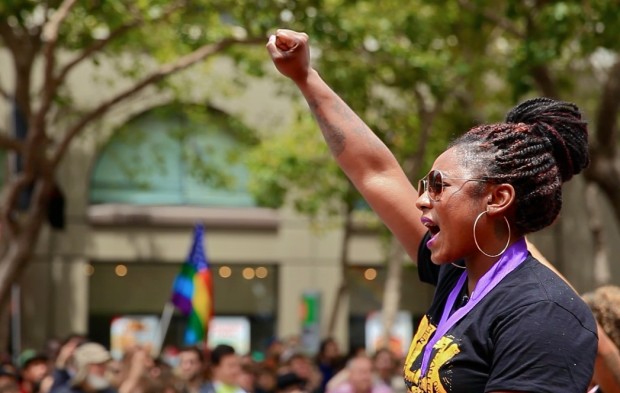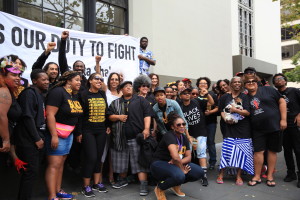Alicia Garza of #BlackLivesMatter Serves as Grand Marshal, Speaks at SF Pride Parade
Jul 7, 2015
Posted in Equal Rights/Equity, LGBT
“We have a lot of work to do to make sure that there is equity for all of us,” says Garza

Oakland’s Alicia Garza, co-founder of #BlackLivesMatter, was selected as Community Grand Marshal for the 2015 Pride Parade and spoke before City Hall about the need to keep fighting for all Black lives. Photo by Tulio Ospina.
By Tulio Ospina
Amid the rainbow-clad crowds cheering at this year’s San Francisco Pride Parade arose a mass of Black Power fists. They belonged to the Bay Area contingent of #BlackLivesMatter, an organizing network comprised of an intergenerational and all-gendered crew of activists fighting for the human rights of Black people around the world.
Amid the rainbow-clad crowds cheering at this year’s San Francisco Pride Parade arose a mass of Black Power fists. They belonged to the Bay Area contingent of #BlackLivesMatter, an organizing network comprised of an intergenerational and all-gendered crew of activists fighting for the human rights of Black people around the world.
Alicia Garza, the Oakland-based co-founder of #BlackLivesMatter, was selected as the Member’s Choice for Community Grand Marshal at the 2015 Pride celebration. Grand Marshals are considered local heroes who have made significant contributions to the LGBTQ community and society at large.
Speaking at the parade rally at City Hall, Garza emphasized that despite the progress that has been made, there is still much work to be done for Black lives.
“Is it okay that the average life expectancy of a Black trans person in this country is 35 years old? No, that ain’t right!” said Garza.
“Is it okay that there’s more Black people in jail than are in the population of San Francisco right now? Hell no! Look around you right now. Do you know this city has less than a four percent Black population? And that is not a mistake, my friends,” she said.
#BlackLivesMatter was co-created by Garza along with Patrisse Cullors and Opal Tometi in 2013 after the acquittal of George Zimmerman in the murder of Trayvon Martin. Symbolically, it has stood firmly “as a love note to Black people in the face of state and vigilante brutality, violence and oppression,” said Garza.
The network began as a hashtag and expanded into an international organizing project, seen by many as an affirmation and embrace of the resistance and resilience of Black people.
Last Sunday, over two dozen #BlackLivesMatter organizers and supporters marched in the Pride Parade behind Garza who sat next to Miss Major, last year’s Community Grand Marshal, in a convertible reserved for her.
The movement’s supporters carried a banner inscribed with Assata Shakur’s name and her famous call, “It is our duty to fight.” They were dressed mostly in black in contrast to the colorful gathering surrounding them.
The group was mostly comprised of Black queer and trans people, some just married.
“With our contingent in the parade, we tried to hammer home the message that all Black lives matter, that Black trans lives matter, that Black queer lives matter and that Black people are also queer and are also trans,” said Garza.
“As we think about the celebration of Pride, let us not forget that the road is still long and that we have a lot of work to do to make sure that there is equity for all of us,” urged Garza after her speech.
“We’re going to keep pushing forward this motto: ‘None of us are free until all of us are free.’”

#BlackLivesMatter came out in full force to San Francisco’s Pride Parade 2015 on June 28 to highlight the intersections between race, gender, sexual orientation, ability and class. Over two dozen Black organizers and affiliates marched down Market Street with their fists raised and a banner that quoted Assata Shakur’s words: “It is our duty to fight.” Photo by Tulio Ospina.